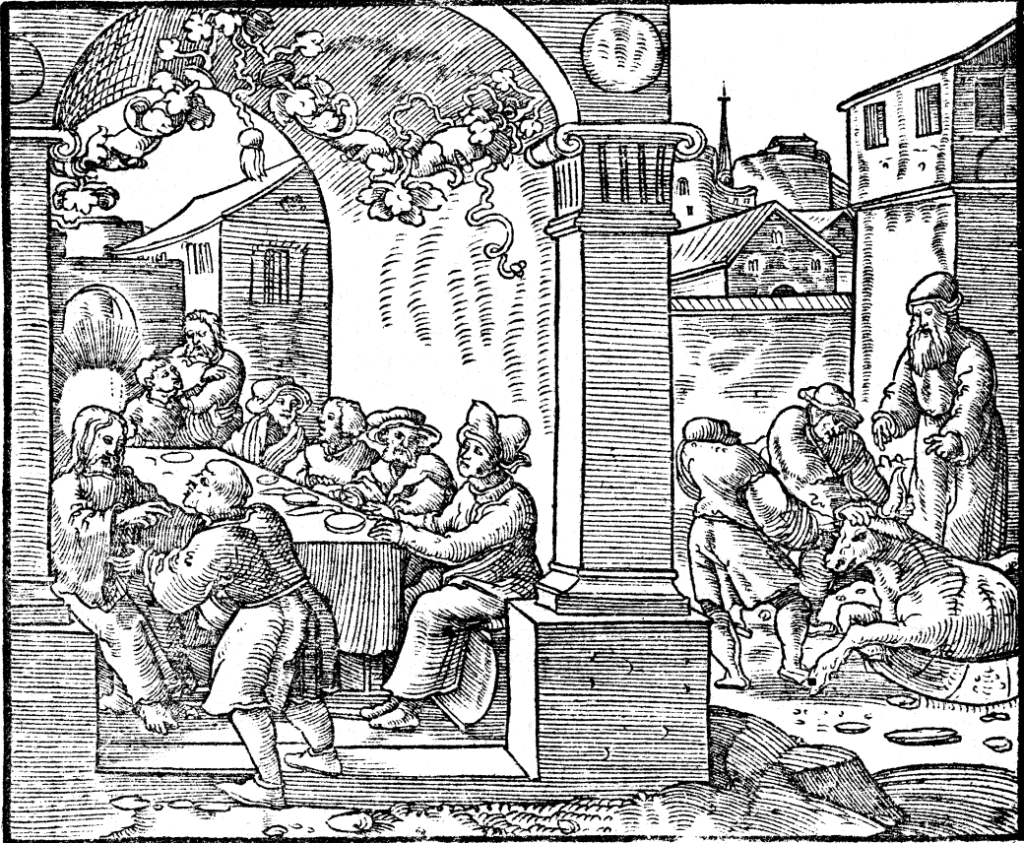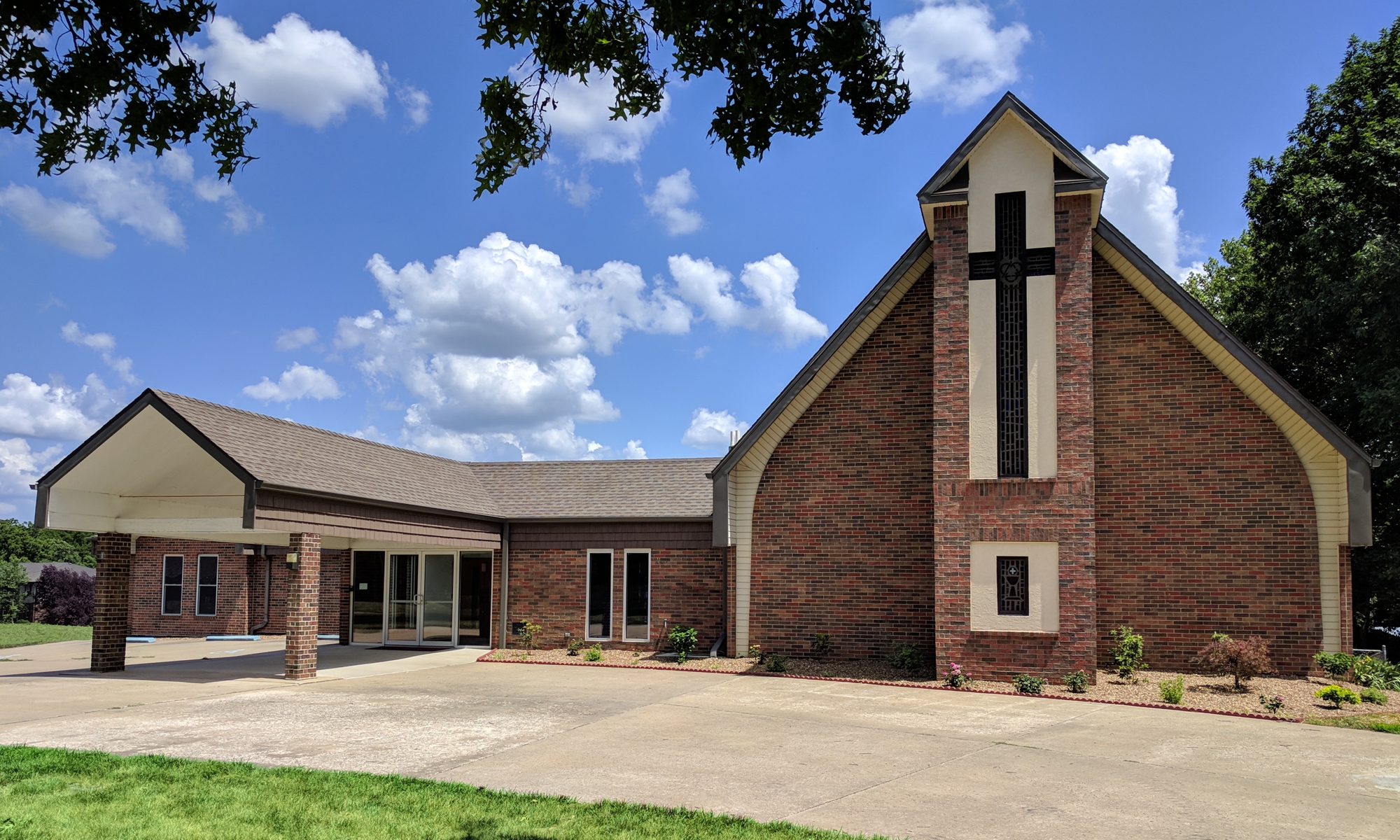
Lessons: Proverbs 25:6-14, Ephesians 4:1-6, Luke 14:1-11
Hymns: LSB 613, 557, 630, 544, 865
Grace, mercy, and peace to you from God our Father and our Lord and Savior, Jesus Christ. Amen.
The Pharisees rejected John the Baptist and they despised Jesus. Yet in today’s Gospel, Jesus is invited to dine at the house of a ruler of the Pharisees. Because St. Luke reports that they were watching Jesus carefully, it appears that they were trying to trap Jesus. From the surface, their invitation could look sincere. But deep down, their thoughts were sinister and deceiving.
Jesus knows the hearts of men, and He knows your very thoughts. Using His divine omniscience, Jesus could have known the true reasons for His invitation to the Pharisees’ dinner. But we do not have divine omniscience. So if your enemies invite you to dine with them, you do not know their hearts. You will probably assume that the invitation is a trap—that you’re being lured in for something bad. But your assumption could be very wrong. It could be that your enemies are truly seeking reconciliation with you—that they are seeking forgiveness—that they want to make amends. After all, that’s what Christians desire and work toward. In the Bible, it’s known as loving your neighbor as yourself.
Also present at the dinner is a man with dropsy. St. Luke does not suggest the reason for his presence. Normally the Pharisees would not want to be bothered by people with such medical conditions. But it could be that he is a relative to the homeowner. I think most likely he is there to serve as bait for the Pharisees to lure Jesus into a trap.
But because Jesus knows the hearts of men, He asks them a question. “Is it lawful to heal on the Sabbath, or not?” They did not answer Him. Perhaps they tried to hide their collective gulp when He asked that question. Perhaps they were turning white with surprise or red with anger. If they were trying to walk Jesus into a trap, it surely backfired. He saw their hearts, their plan, their scheme, and made it clear to them He knew what they were doing.
In Old Testament times, there were laws governing the Sabbath. The Sabbath Day began 6 p.m. Friday and ended 6 p.m. Saturday. The word “sabbath” means rest and God’s people were expected to rest, following the example of God who created the world in six days and rested on the seventh. Their time of rest was to be sanctified by the Word of God. So it was not just a day to relax and do nothing; instead, it was a day set aside so God’s holy people would be “holied” by God through His holy Word. They would be sanctified by the sacred Scriptures which were written to make them wise for salvation.
The Sabbath law is codified in the Ten Commandments. The Third Commandment declares, “Remember the Sabbath Day by keeping it holy.” Each of the rest of the commandments were God’s required law at creation, throughout the Old Testament and New Testament eras, in our day, and even at the return of Jesus. But the Third Commandment is a little different. You see, the regulation to rest on Saturday is fulfilled in Christ. It was part of the Old Testament Ceremonial Law. Colossians 2:16-17 states, “Let no one pass judgment on you in questions of food and drink, or with regard to a festival or a new moon or a Sabbath. These are a shadow of the things to come, but the substance belongs to Christ.” The various commands and prohibitions in the Ceremonial Law were intended to foreshadow Christ. Now that He has come in the flesh to take away the sin of the world, the requirements of that Ceremonial Law have been fulfilled. Yet, the laws to love God and love our neighbor continue. The Moral Law has not changed.
So, then, what do we make of the Third Commandment? Luther gets it right when he wrote in the Small Catechism, “We should fear and love God so that we do not despise preaching and His Word, but hold it sacred and gladly hear and learn it.” The emphasis is no longer on resting, but on the Word. The Third Commandment is upheld when we gladly hear and learn the Word of God, not despising it.
In this month’s newsletter, I included a few statistics about our congregation. I revealed that over half of those who hold membership in our congregation have not been to our church even once this year. Among those who are communicant members—promising they will be faithful in their use of the means of grace and suffer all, even death, rather than fall away from their Christian conviction—still over half of them have not received Holy Communion at Grace this year.
How are they not despising preaching and His Word? How are they not in clear violation of the Third Commandment? The same could be said, though, of those who only darken the door of the Church on Christmas and Easter or those who forgo the house of God for months on end for whatever reason.
You can see how this commonly plays out. The first generation goes to church faithfully every Sunday as children but when they grow up and have children, they find other things to do on some Sundays so that second generation does not go to church every Sunday. Since that second generation learned from their parents that Church may easily be replaced with other pleasures of this world, when they group up, they rarely take their children to church. That third generation may be forced through Confirmation but then they pretty much fall away. Their children probably won’t get baptized and won’t go through Confirmation. The idols of day—usually involving pleasures of the flesh—are loved more than God.
God did, after all, declare when giving the Ten Commandments, “You shall not bow down to [idols] or serve them, for I the Lord your God am a jealous God, visiting the iniquity of the fathers on the children to the third and the fourth generation of those who hate me” (Ex. 20:5). Idols could be sports, sleep, work, recreation, even vacation—anything that keeps people from coming to God’s house.
So how do we end that cycle? We don’t doit on our own, but Jesus can and does. In today’s Gospel, Jesus spoke by way of a parable. He began, saying, “When you are invited by someone to a wedding feast.” You see, the Divine Service is a wedding feast. Christ, our Bridegroom, comes into our presence. He feeds us His Word, His Body, and His Blood. He cleanses us of our sin and presents us before our Father in Heaven as holy and innocent.
We confess that we deserve temporal punishment and eternal death for our sin. Instead of our Savior saying, “You go that right. You will surely go to Hell for your many sins,” Jesus says, “Friend, move up higher.” He exalts the lowly. That is, He lifts up the penitent sinner. He says to the sinner who confesses his sin, “You are Mine. I have wed Myself to you. I cover you with My righteousness. I present you to My Father as holy and innocent.”
He does so because it was His joy to go to the cross to pay for the sin of the world. He declares you innocent because He was held guilty in your place. He covers you with His righteousness because He was stained and soiled with your sin as He shed His innocent Blood on the cross.
That is how Jesus exalts you. Not by making sure you have some sort of giant nest egg or by helping you own lots of expensive stuff or by giving you name recognition or even good health. Instead, He exalts you by adding you to His family through the waters of Holy Baptism. He exalts you by teaching you His saving Word. He exalts you by feeding you His Body and His Blood for your forgiveness.
He first humbles us through the Law. We need the Law’s accusations. We need to see how we fail to measure up. That way we are no longer exalting ourselves. That way we draw near to Him humbled so that He will be the One to exalt us. That way we can exalt Him by praising Him and thanking Him with sincere hearts. Without the Law, we would not know why we need Christ or His saving Gospel. Without either Law or Gospel, we would not know why we need to gather in God’s house in the first place.
In today’s Gospel, the Pharisees did not gather on the Sabbath for the right reason. They wanted to trap Jesus, finding a way to silence the Savior. They failed. Jesus healed the man with dropsy and sent him on his way. He showed the Pharisees their hypocrisy when He asked them if they would rescue their own ox on the Sabbath but refuse to help their suffering neighbor such as the man with dropsy because they needed to keep themselves holy on the Holy Day. They hypocritically would ignore their interpretation of the Sabbath laws to help out their own animal on the Sabbath, but would not help out a fellow human being on the Sabbath for they called that forbidden work.
The Pharisees would not answer Jesus. They were unwilling to be humbled by Him. They would not submit to Him. Their hearts were hard.
It’s easy to fall into the same trap. To not answer Jesus when asked why we are not gathering in His house very often, to not be humbled by Jesus or to be unwilling to submit to Him. But these traps are tools of Satan to lure God’s people away from Christ who have tasted and seen that the Lord is good.
We have sinned and have fallen short of the glory God. We don’t purify ourselves and make ourselves worthy before entering into God’s house. We enter this place as sinners ruined by the Fall. Jesus graciously meets us with His gifts. He forgives us. He covers us with His very righteousness. He sends us home justified, forgiven. For He adopted us into His family by Baptism, He exalts us, and He wants us to be with Him in Paradise. Amen.
The peace of God which passes all understanding keep your hearts and minds in Christ Jesus to life everlasting. Amen

